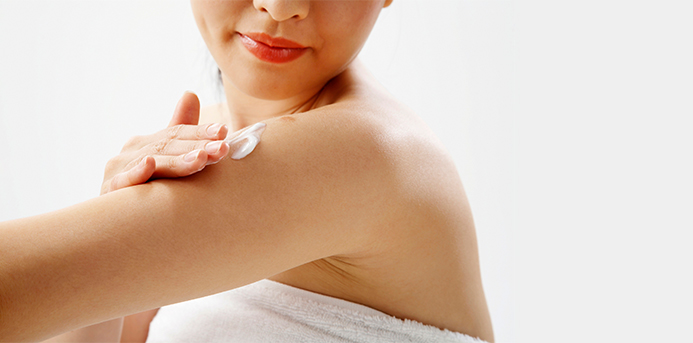Chapped hands, cracked lips and dry skin everywhere. Winter’s definitely here! According to dermatologist Jordan Carqueville of The Skin Care Center in Glenview and Chicago, “dry skin occurs when there’s a lack of water in the epidermis (the top layer of the skin). Oils on the skin’s surface hold water in, so special care needs to be taken to preserve these oils.” These tips will help keep your skin hydrated until summer (eventually) returns.
Moisturize
Winter moisturizer is essential, but not all are created equal. Carqueville recommends looking for one that contains lipids (ceremides) and humectants (hyaluronic acid, glycerin and NMF, which stands for natural moisturizing factor). In laymen’s terms, these key ingredients will draw water to the skin, help seal in moisture and enhance the skin barrier. Carqueville suggests Eucerin Professional Repair Extremely Dry Skin, CeraVe Moisturizing Cream or Amlactin Moisturizing Body Lotion, which can be found at your local drugstore. Avène Tolérance Extrême is Carqueville’s preferred dry skin face moisturizer as it’s hypoallergenic, non-comedogenic, and contains both lipids and humectants. (Try this Nectar Hand Soap and Lotion by Tatine from Exhibit, now on Shop For Good.)
Drink
Water hydrates you from the inside out and has countless benefits including skin that looks and feels great. Water hydrates and plumps skin, making wrinkles and pores become less visible. “Drink a glass of water one hour before bedtime,” says Julius Few, MD, director of The Few Institute in Chicago, “and discontinue alcohol consumption at least one hour prior to bedtime.” Also, consider increasing your overall daily water intake and reducing your caffeine intake.
Eat
According to Ayurveda, a system of natural healing, dry skin is caused by an increase of Vata dosha (the energy that controls movement, considered the leader of the three Ayurvedic mind/body principles, or doshas) in the body and what you choose to eat can affect the Vata dosha level. To help balance Vata dosha, avoid eating spicy, bitter or fried food. Instead, try to consume warm food (less raw food), warm water, juicy fruits, and sweet, sour and salty foods.
Bathe
Carqueville recommends limiting baths and showers to less than 10 minutes and avoiding very hot showers. Use mild, non-fragranced cleansers that don’t strip moisture from the skin. “Avoid soaping up areas of the body that are not ‘dirty,’ only using soap on the arms, legs and trunk if needed, so that the natural oils are not removed,” Carqueville explains. “Apply moisturizer or body oil within three minutes of getting out of the shower to lock in the water that was just absorbed in the shower or bath.
Humidify
Humidifiers in the bedrooms of your home will replenish some of the humidity in the air during sleep. Humidifiers are also often integrated with central heating systems. “When the weather turns cold and the heaters go on, the moisture in the air decreases. Just as our skin becomes moist and supple from a trip to humid Florida, it becomes parched and flaky in the dry winter climates,” says Carqueville. “Ideal humidity is 35-45 percent in the winter months.”
Use Massage and Oils
“Massage is considered the traditional method of healing,” notes Anna Pamula, owner of Renu Day Spa in Deerfield. “Freezing weather shrinks skin pores, causing heat build-up which result in imbalances in the skin such as blemishes, rashes, redness and sensitivity. Oils such as avocado, olive, sesame, almond and walnut oil are beneficial, and when applied through massage, the oils can really penetrate the skin, nourish the body and help excrete toxins.” Pamula also favors coconut oil, which is thought to have dosha-balancing properties.
Exfoliate
For years, Dara Levy, a Highland Park native and creator of the at-home facial exfoliating system Dermaflash Facial Exfoliating Device, researched the effects of exfoliating skin. While it’s always a good idea to exfoliate, Levy believes that it’s even more essential to exfoliate in the winter when there’s a lack of humidity. “Dead skin cells reduce the amount of absorption you get from the products you apply, and increase winter dryness and irritation,” says Levy. “Exfoliation encourages proper cellular turnover by removing old dead skin cells and speeding up cell renewal which enables new healthy skin cells to grow. As we age, cellular turnover slows down. This slower turnover and excessive dead skin laying on the surface is one of the causes of a dull, dry, lackluster complexion.” Likewise, Pamula recommends exfoliating since it removes dead surface skin cells, which would otherwise act as a barrier preventing oils and creams from soaking in.
Want more beauty, food, family and philanthropy content delivered straight to your inbox? Sign up for Make It Better’s bi-weekly e-newsletter, the Better Letter!

